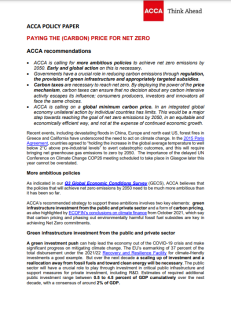
Recent events, from devastating floods in China, Europe and the US, to forest fires in Greece and California, have underscored the need to act on climate change. In the 2015 Paris Agreement, countries agreed to work to keep the increase in the global average temperature to well below 2°C above pre-industrial levels to avert catastrophic outcomes. This will require bringing net greenhouse gas emissions to zero by 2050.
This policy paper calls for more ambitious policies to achieve net-zero emissions by 2050. It emphasizes the government's role in reducing carbon emission through regulation, and it also includes the necessity of carbon taxes to reach net zero. By deploying the power of the price mechanism, carbon taxes can ensure that no decision about any carbon-intensive activity escapes its influence; consumers producers, investors and innovators all face the same choices.
